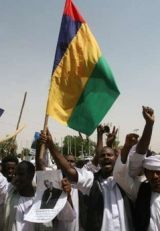East Sudan rebel leaders join national government
August 27, 2007 (KHARTOUM) — Leaders of the ex-rebel Eastern Front arrived in the Sudanese capital on Monday to take up positions in central government as agreed in a 2006 peace deal.
 Hundreds of cheering Eastern Front supporters, from the non-Arab Beja and the Arab Rashaidiya tribes of Sudan’s arid east, turned out to greet them and hailed their arrival as the prelude to development in their impoverished region.
Hundreds of cheering Eastern Front supporters, from the non-Arab Beja and the Arab Rashaidiya tribes of Sudan’s arid east, turned out to greet them and hailed their arrival as the prelude to development in their impoverished region.
“The people are expecting the agreement will yield fast results if the government is serious,” said Amer Adiem, a member of the Beja tribe who was attending the welcoming ceremony.
“If the government plays around though, it will all go to hell,” he added.
The October 2006 peace deal, mediated by neighbouring Eritrea, ended an Eastern Front campaign that had lasted a decade. Internal disputes over posts delayed implementation.
Sudanese Vice President Ali Osman Mohamed Taha welcomed Front leaders to join the government in building a new phase of life without bloodshed.
“We want to heal the wounds and we want the people of Sudan to overcome the stage of conflict and divisions,” he told a cheering, sword-waving crowd of Front supporters.
“But the stage after peace is a difficult stage that requires patience,” he added.
The peace deal is the third forged between Khartoum and regional rebel groups in three years. The previous two are a still shaky deal between north and south, and the Darfur Peace Agreement, which has done little to quell four and a half years of violence in the far western region of Sudan.
Like the other deals, the latest agreement contains a power-sharing clause that gives the Front three high-ranking seats in Khartoum and a number of parliamentary seats.
The Eastern Front will have one junior minister, plus an assistant to the president and an advisor to the president.
Khider Omar, a London-based member of the front’s central committee, said the eastern agreement would see more progress than the others.
“We do not need anything for personal issues. This is the difference between the Eastern Front and the others. We are putting our people first,” he said, adding that unlike some southerners, the Front was not considering secession.
“We are not considering separation in our process. (We want) to be in a unified country but to have our share in the power and in the resources,” he said.
The east is home to the nation’s largest gold mine and Sudan’s only port, through which a pipeline carries 500,000 barrels of crude oil a day.
But the region has one of the highest malnutrition rates in the country and has seen little development.
“The important issue is to start the development process for the eastern people,” Omar said. “We want better education, better health, a better environment, and better development of roads and water resources.”
(Reuters)
